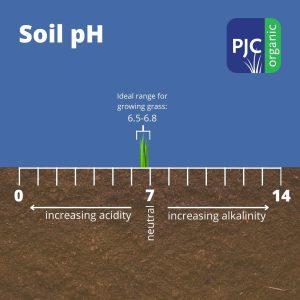Excerpts from UMASS Hort Notes 2024 Vo. 35:4…Many soils in Massachusetts are naturally acidic (pH below 6.5). Notably, acidic soil can stunt growth, reduce nutrient availability, and can increase damage from soil-borne disease. Therefore, landscapers and gardeners need to manage soil acidity when growing plants. Here, we’ll discuss the relationship between nitrogen fertilizer and soil acidity.
Ideal pH for Growing Turf Grass
 Turf grass prefers a neutral pH (6.5 – 7.0). Limestone, and similar rock powders, are used to raise soil pH and promote healthy plant growth. However, surface-applied limestone is slow to penetrate into the soil and lime is commonly under applied. Although lime is an important tool for managing or preventing soil acidity, it is not the only one. Choosing nitrogen fertilizers can also have a substantial effect on soil acidity. Nitrogen fertilizer comes in a variety of forms and can raise or lower the soil pH. In Massachusetts, we are mainly concerned with the fertilizers which acidify, since it is uncommon for regional soils to become alkaline (pH higher than 7.5).
Turf grass prefers a neutral pH (6.5 – 7.0). Limestone, and similar rock powders, are used to raise soil pH and promote healthy plant growth. However, surface-applied limestone is slow to penetrate into the soil and lime is commonly under applied. Although lime is an important tool for managing or preventing soil acidity, it is not the only one. Choosing nitrogen fertilizers can also have a substantial effect on soil acidity. Nitrogen fertilizer comes in a variety of forms and can raise or lower the soil pH. In Massachusetts, we are mainly concerned with the fertilizers which acidify, since it is uncommon for regional soils to become alkaline (pH higher than 7.5).
Nitrogen Fertilizer
Nitrogen fertilizer is typically applied in one of four forms (or their combination):
- Nitrate (NO3–): Reduces soil acidity. While this can lead to excess alkalinity it is not a common problem in New England because the soil has a tendency to return to its natural, moderately acidic state.
- Ammonium (NH4+): In contrast to nitrate, … NH4+ can acidify the soil.
- Urea (CO(NH2)2): Urea is quickly transformed into ammonium in the soil and has a similar effect on increasing soil acidity.
- Organic Nitrogen (compost, composted manure, animal and plant byproducts): Most organic nitrogen sources contain both ammonium and nitrate but also a wide range of buffering molecules. These amendments make the soil more neutral regardless of the original pH and can be used easily on plants which prefer a neutral soil pH.
When fertilizers contain multiple forms of nitrogen, their effect on soil acidity will be in between the effects of the components.
Side Notes: Some phosphorus fertilizers can also have acidifying effects on the soil. Sulfur fertilizer can be highly acidifying if applied beyond plant needs but does not acidify the soil when applied according to fertility requirements.
Take Home Messages
- Nitrate or organic nitrogen fertilizers are preferable, if keeping a neutral pH is important for plant health.
- When using ammonium or urea fertilizers, extra care should be taken to avoid over-fertilization. Make sure to regularly test the pH of the root zone soil.
- Make sure to consider the effect on soil acidity when choosing a nitrogen fertilizer along with other nutrient needs.
Read the article in its entirety: UMASS Hort Notes 2024 Vo. 35:4 by Arthur Siller, UMass Extension Soil Health Educator.
